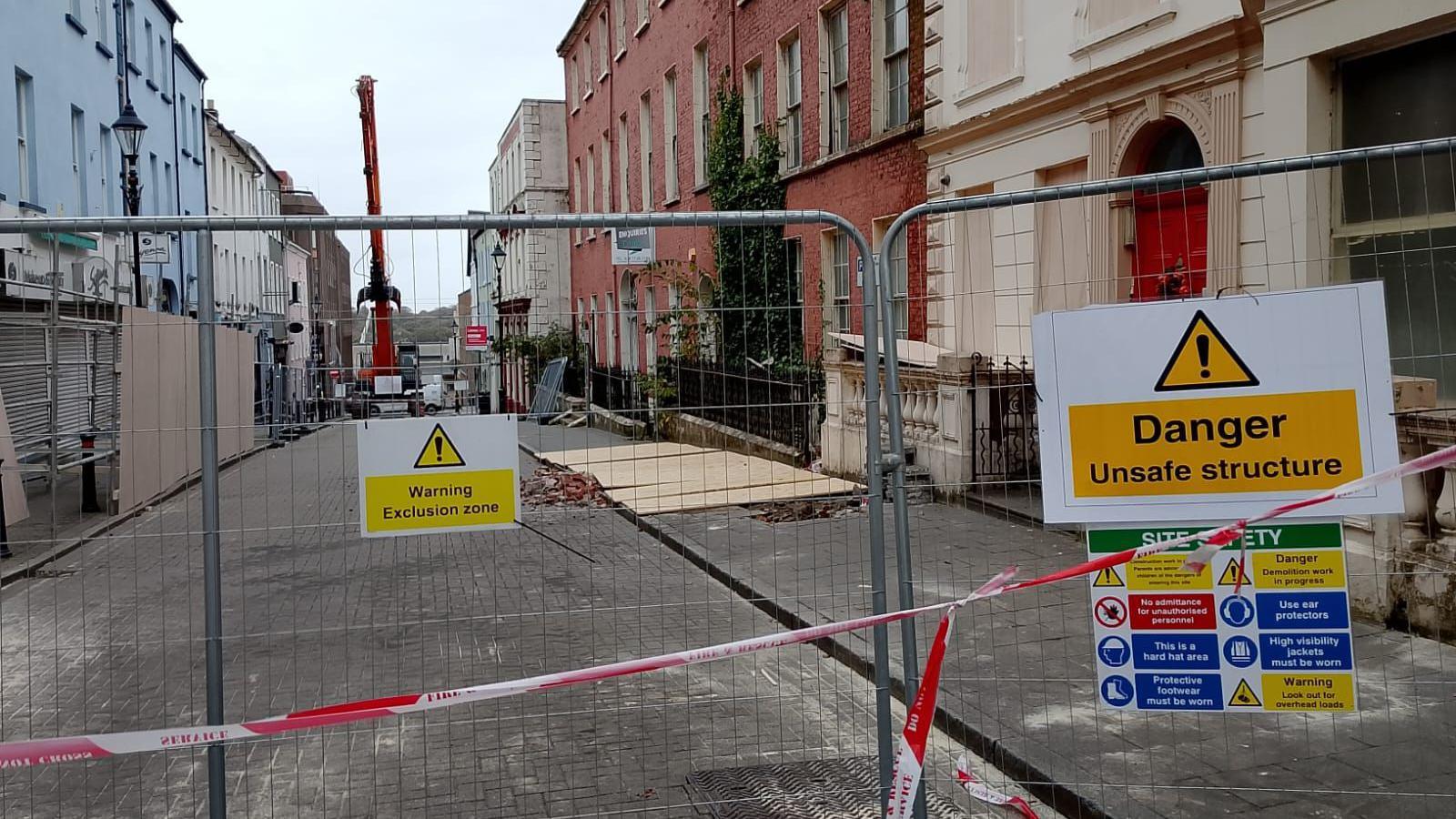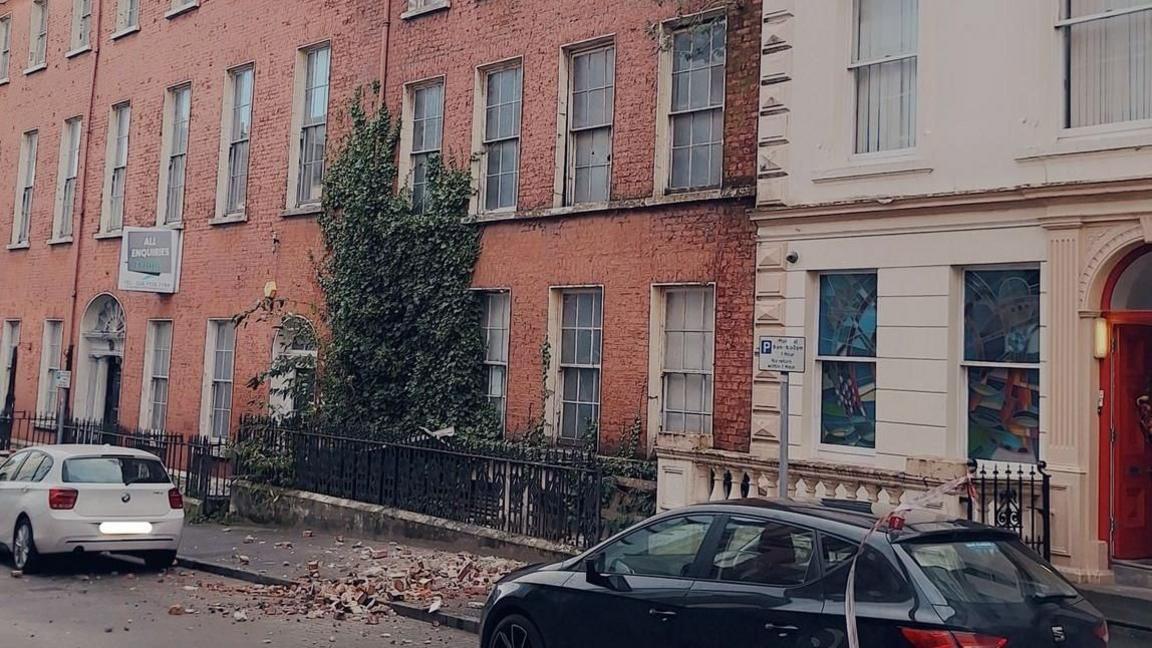Traders affected by 'unsafe building' disruption

Ciaran Bell, from Thomas Goldsmiths Jewellers, says the partial closure of the Pump Street has led to a sharp drop in customers
- Published
Some businesses in Londonderry have been severely affected by the partial closure of a street due to a centuries-old, unstable Georgian building, which is under threat of demolition.
Barriers were erected near the former Convent of Mercy on Pump Street, after a section of the facade fell onto the pavement below last weekend.
A demolition team has been on stand-by this week, as discussions continue about whether the listed building can be saved or needs to come down.
Ciaran Bell, from the Thomas Goldsmiths jewellery shop opposite, said the partial closure of the street this week has led to a sharp drop in customers.
'We are open but shutters are down'
"We closed on Wednesday and yesterday was dead, but the communication around this has not been very good," he told BBC Radio Foyle's North West Today programme.
"Earlier in the week, we were told the building would be demolished and a crane and other machinery arrived on the street but that still hasn't happened.
"We are open, but we've been told to keep the shutters down and we don't know how long this is going to go on."

Cordons are still in place at the junctions with Ferryquay Street and London Street
The owner of The Spa on Pump Street said their takings were also down since the street's partial closure.
"This recent disruption has left the street badly affected," Ann McNally said.
"Most businesses are closed and may be for the foreseeable future."
She said passing trade was "non-existent" and because the lower end of the street is closed at Ferryquay junction, people assume they are all closed.
"It is going to have a serious impact on all of us as we approach the Christmas season in the next few months," she said.
Ms McNally described the building as a "health hazard waiting to happen for a long time" as it was "evident the building was derelict and very unsafe".
The Department for Communities' historic environment division (HED) said it was working with the local council and the building's owner to assess the structure and explore next steps.
The department said a senior conservation architect has been involved in meetings with council officials and the owner since Monday.
"The department continues to advise that any intervention should seek to minimise loss of historic fabric while ensuring public safety," a spokesperson said.
The decision to fully or partially-demolish the building, or try to save it, ultimately lies with the council but officials are still weighing up the best option.
They are trying to balance the need to protect public safety against preserving the built heritage.
Access to Pump Street has been limited all week as safety assessments and discussions continue.

A pile of bricks fell on the pavement below the Georgian building on Pump Street last week
A spokesperson for Derry City and Strabane District Council said it has been working since Sunday with the premises owner, agent, and stakeholders to find a solution that balances heritage conservation and public safety.
The council said they remain committed to resolving the issue in partnership with the owner, statutory bodies, and local stakeholders, with public safety as its main concern.
Marie Brown, chief executive of Foyle Women's Aid and the Family Justice Centre, said she was "appalled" that the building had been allowed to fall into such disrepair.
Plans to redevelop the convent into a new Family Justice Centre were first proposed almost a decade ago but did not go ahead, with the organisation eventually relocating to Bishop Street.
Speaking on BBC Radio Foyle's North West Today programme, Ms Brown said she was disappointed to see the building "left in such a state of decay".
"There is so much history attached to this building, and it's also an important part of the fabric and history of this city," she said.
Listed building on 'at risk' register
The damaged property dates back to the 19th Century and now forms part of a complex of protected structures, near St Columb's cathedral.
It is believed part of the interior of the four-storey building has collapsed.
It was constructed in the early 1800s and once housed the offices of the Londonderry Sentinel newspaper.
The Catholic Church bought the adjacent King's Arms hotel in 1840 and during the famine an order of nuns, the Sisters of Mercy, was asked to establish a convent at the site.
By 1890, the nuns were expanding their vocation in the city and so they acquired the former newspaper office building and incorporated it into their convent site.
In the late 1970s, the convent became part of an architectural conservation area and in 1979 the complex was listed as a grade B protected building.
The Sisters of Mercy left the Pump Street site in 2005 and a few years later the buildings were briefly used as an antique and curiosity shop.
However, the former convent complex is now on the Department of Communities "Heritage at Risk" register, which said the site was in "very poor" condition and its level of risk was assessed as "critical".
The Martin Property Group, which owns the building, has been approached for comment.